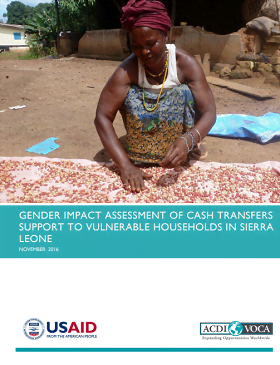Gender impact assessment of cash transfers support to vulnerable households in Sierra Leone
This report outlines the findings and recommendations from a qualitative assessment carried out to complement and further develop the findings from a recently concluded quantitative study of SNAP+ in order to better understand the driving factors behind behavior during the Ebola crises.
The quantitative study, completed in July 2016, assessed how program participants spent the funds distributed from the CTP. The study identified the development of certain coping mechanisms around how cash was spent. After households stabilized their initial food needs by spending a very high percentage of the initial transfers, the study determined that average spending tapered to 30 percent on food and 20 percent on education, with the rest going to health care, income-generating activities, and paying debts.
This gender impact assessment sought to understand a household’s financial decision-making process and the gender and social dynamics that informed those decisions. This impact assessment is intended as a learning opportunity for donors, implementing partners, and other key stakeholders, including government officials, to better inform the design and implementation of cash transfer mechanisms as part of relief and humanitarian crisis response.



